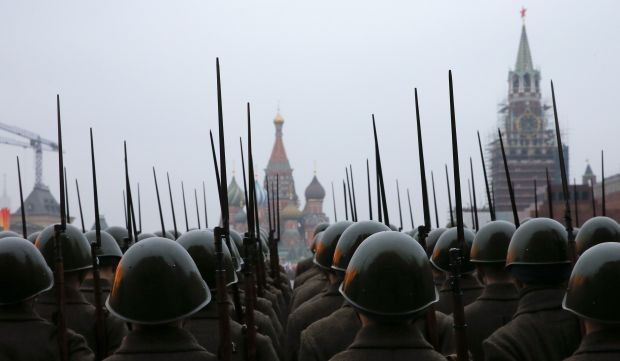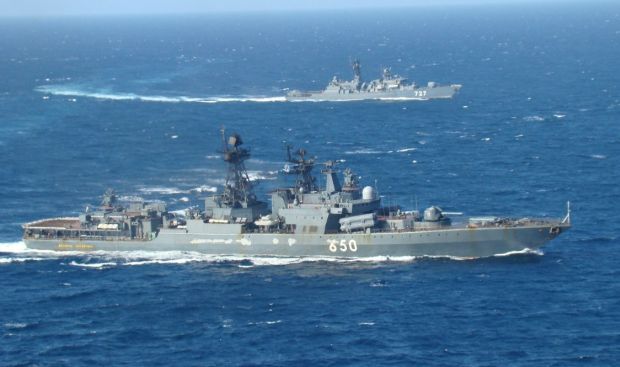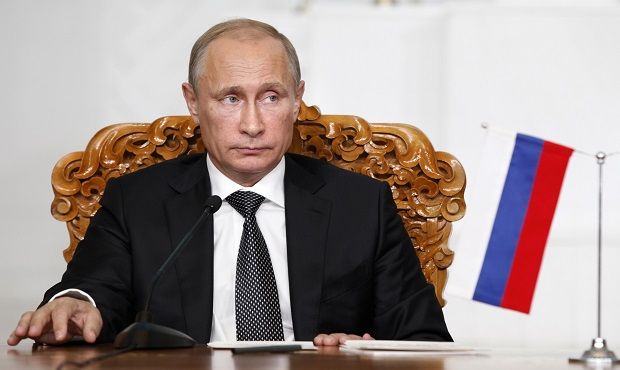
Kremlin's ambitions in Syria
Overall adverse foreign policy situation in Russia ahead of the UN General Assembly forces the Kremlin to look for ways to re-gain a foothold on the world political scene. But will the international community believe the aggressor who has been using double standards?
In September, 2013, the Syrian issue allowed President of the Russian Federation Vladimir Putin to win the foreign policy jackpot, displaying Russia as a peacekeeper and a major geopolitical player (it is about a compromise proposal to transfer Syrian chemical weapons under international control and fully utilize them).
Two years later, in 2015, the Kremlin is playing the Syrian card again. Weighed down with sanctions for the annexation of Crimea and the incitement of conflict in the east of Ukraine, the Kremlin can only tell the fairytale of its geopolitical "greatness" to its own citizens. The Syrian issue is among the hot topics in the Russian media. But, in this regard, we should not exclude that the UN General Assembly is quite a fertile audience seeking hear about global threats. Therefore, Vladimir Putin can try to play a trump card while addressing the General Assembly, suggesting, for example, to create an anti-terrorist coalition led by Russia to fight the Islamic State.
Such scenario has been prepared since this summer, to say the least. Russian Foreign Minister Sergei Lavrov and Russian President Vladimir Putin have both said that the Kremlin was in favor of the initiative to create a broad front against terrorism with the participation of Syrian government troops, the Iraqi army and the Kurds. Moreover, Putin announced that he had discussed this issue with the leaders of Saudi Arabia and Jordan, the presidents of Turkey, Egypt and the United States.
But talking about the anti-terrorist coalition, which may be interesting to various parties, is one thing; another thing is building up its own military presence in the region, deploying “little green men” to Syria under the pretext of supplying military equipment to the official Syrian authorities to combat terrorism.
New destination of the “little green men”
Following the first media reports in early September of the Kremlin increasing its military presence in Syria U.S. State Secretary John Kerry said that "such actions could lead to a further escalation of the conflict." The Russian Foreign Ministry responded that Russia did not deploy its military in Syria, but officially supplied military equipment. Nevertheless, there was a video evidence of the Russian "little green men" directly participating in the conflict on the side of the army of Syrian President Bashar al-Assad (the video showing the offensive of the Syrian army, also recorded Russia’s latest armored personnel carrier with conversations in Russian language heard in the background). Russian military advisers are believed to have been in Syria for a long time in the framework of Moscow’s assistance to the Syrian regime. However, until now there was no evidence of their participation in military operations, according to The Times.

In addition, the pictures of Russian troops from at least two separate military units deployed in Syria - 810th Marine Brigade and the 336th Guards Marine Brigade have hit the Internet. According to the American private intelligence company Stratfor, the Russians are building a military base at the Syrian airfield, preparing for future operations.
"The reinforcement of the airport shows that Moscow is preparing to deploy aerial assets to Syria, if it has not already done so. To sustain an overseas presence, Moscow must establish a sustained logistical connection and have forces in place to defend it. In this case, Russia is looking to establish an air bridge, with everything that entails. Stationing Russian aerial assets — such as fighter jets and attack helicopters — inside Syria is a clear escalation of Moscow's involvement in the country. Russia's previous involvement was limited to the transfer of equipment, spare parts and weaponry to the Syrian government and the provision of intelligence support," according to the report.
As a result, despite the fact that the Syrian authorities denied on Tuesday some media reports of the presence of the Russian military, saying that it was just a fiction of the Western intelligence, a number of countries, including Bulgaria and Ukraine, closed airspace to Russian aircraft heading to Syria.
Regaining former influence
According to Viktor Nebozhenko, political scientist, director of the Ukrainian Barometer sociological service, after a year of armed aggression against Ukraine, the Russian generals simply cannot be driven back into barracks. Therefore, Putin benefits from giving them an opportunity to rattle sabers at the new site, which turned out to be Syria. "The Russian army wants to fight, and Putin has nothing left but to give it a new piece of meat," he said.
"In fact, Russia has had an advanced naval base in Syria sice the times of the Soviet Union. The Russian military presence (military experts) has persisted in Syria for a long time and has certain traditions. Now, as I understand it, Russia took advantage of the formal consent of the U.S. to a more active military countering of the Islamic State. It took this opportunity to start amassing its presence both with the experts and the troops. Weapons are being actively transferred, just like they were at the beginning of the armed conflict in Syria," said Bohdan Yaremenko, Ukrainian diplomat, head of Maidan of Foreign Affairs foundation.
According to him, the current geopolitical game that Russia has started is a matter of prestige and maintaining Moscow’s presence in a very large region of the Middle East and North Africa, where, after the collapse of the Soviet Union, it has been superseded. "And, of course, it is Putin’s very symbolic political gesture that can be interpreted as “I don’t leave my allies behind’,” said the diplomat.
However, the Russian president may easily exchange the Syrian issue to some other, more favorable, political benefits. “Russia’s greater involvement in Syria indirectly increases the importance and significance of its arguments in political bargaining on all issues, for example, U.S.-Russian relations," said Yaremenko.
"Russia is committed to playing the role of a superpower, seeking to restore the status, which the Soviet Union had at the time. That is, a statue of a global player, which has enough strength to resist the United States and the whole West on different continents, which has allies and leads a global game," said political scientist, head of the Penta Center for Political Studies Volodymyr Fesenko.

However, in his opinion, "Russia is much weaker than the Soviet Union." But Putin has more than enough ambitions to play this game. "It is demonstrated in various ways, including through gross violations of international law... However, by maintaining presence in Syria, he seeks to influence one of the key regions of the modern world - the Middle East - and have a foothold in this region," he said.
Playing on emotions
Scientific Director of the Institute for Euro-Atlantic Cooperation Oleksandr Sushko said that there has been too little evidence to assess the scale of the Russian military presence in Syria and whether the Russians are really engaged in war Assad’s side, “as there is no information about the victims." In this regard, in his opinion, the whole situation is a show off, "designed to demonstrate Russia’s readiness to take part in the Syrian conflict to some extent - in its settlement or, on the contrary, in its escalation.”
This play on the emotions is of course reflected in the specific arguments of the Western political spectrum, which seems ready to "fall for it." In particular, this can be attributed to the recent statements of former French President Nicolas Sarkozy, who in an interview with French newspaper Le Figaro said that the West should turn the page of the Cold War with Russia.
"Obviously, this moves along the lines of Putin’s expectations. But still, there are few chances he can win over the majority of the Western political players," said Sushko.
However, it is likely that in the near future, the world will hear more voices of Putin's friends, who will encourage turning faces back to Putin, because he is a “very useful person” in a fight against the Islamic State.
"For now, the U.S. has been demonstrating that it welcomes Russia’s more active involvement in certain matters of the global agenda. Nevertheless, the U.S position regarding the annexation of Crimea and the war in the east of Ukraine remains the same," said Bohdan Yaremenko.
As for possible trades between Russia and the West in the form of "exchange of Syria to Ukraine," this version has been actively spun in the Russian media, but it displays rather Russia’s intentions than reality. "No one is considering such an exchange, but Russia seeks to push the West to such swap," says Volodymyr Fesenko.
According to him, the Kremlin will seek to maintain control over the Donbas and of Assad, but it also throws this bait at the West, hoping that "the West will swallow it and try to reach some agreement with Russia, and Moscow will get an opportunity to bargain for a reduction of sanctions or concessions on the Ukrainian issue."
Meanwhile, in the background of a relative truce in Donbas and Russia being drawn into the Syrian conflict, the life will be a bit easier for Ukraine. "If Russia is to open additional fronts, we will have an opportunity to further strengthen our army and the contact line; maybe there will be less risks and threats in Donbas... But thes are only the potential opportunities,” said Fesenko. “In the end, only Putin himself knows how he will act in Syria and Donbas. Often, he acts irrationally, so we can expect any kinds of surprises."
Involvement in the conflict as a generator of problems for Russia
However, Russia can also expect unpleasant surprises due to its involvement in the Syrian conflict. Firstly, the situation can irritate Turley a lot. "In particular, because the ruling party of President Erdogan has long been conducting an active campaign personally against Syrian President Bashar Assad, calling for greater international involvement in the civil war in Syria. Russia and Turkey have already had problems around this issue, in particular, with granting the aircraft the right to pass through national airspace," said Bohdan Yaremenko.
In his opinion, this is one of those elements, which can seriously damage the Turkish-Russian relations. But, to what extent and on what issues, it is difficult to predict. For example, the Turkish Stream is primarily an economic issue. And, to date, Turkey and Russia cannot agree on it purely for economic reasons. "But it is not excluded that misunderstandings which Russia has with Turkey in the Black Sea region and in the Middle East could create a negative background of political relations and political dialogue in the future, which will not allow constructive settlement of some practical issues of bilateral cooperation," said the Ukrainian diplomat.
Secondly, we should also remember about the Islamic State. We have already heard several statements that the IS opens its front in the Caucasus. "Russia can see the same outcome as some European states where local Muslims returned to their states after fighting in Syria and organized terrorist acts," said Volodymyr Fesenko.
Given that Russian citizens are now fighting in Syria, we cannot rule out that they may return to Russia with the “special mission” of the Islamic State. Thus, the risks of the boomerang hitting Russia on its way back from Syria is present. It is still unknow though, what form it might have and what its scale will be.
However, it is worth noting that Russia have already faced the problem of terrorism. Moreover, the government has always used extremism on own soil to strengthen the authoritarian regime and personal power of Vladimir Putin.
Tatiana Urbanskaya, Konstantin Goncharov

